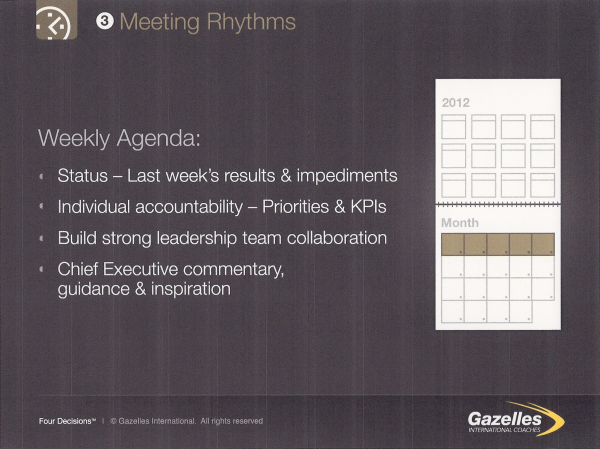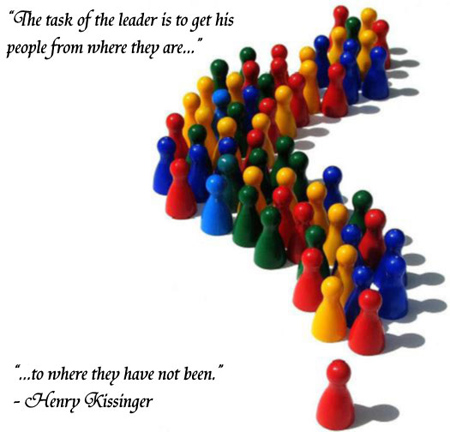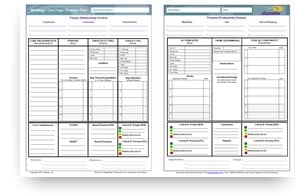What’s the number one function of a leader? It’s the ability to predict.
“The fundamental journey of a growing business is to create a predictable engine for generating wealth as it creates products and services that satisfy customer needs and creates an environment that attracts tip talent.” Verne Harnish, Mastering the Rockefeller Habits
Unless a company has the ability to determine where it is today and project where its’ going to be this week, this month, this quarter, and this year, it’s not on a trajectory for growth. It might not even be on track for survival. A favorite quote of mine is, "When you’re green you grow, when you’re rip you rot!"
Ultimately the reason for imposing structure and instituting systems is to achieve predictability.
This is why Strategic Discipline is such a critical piece to success.
Determine your priorities. Create and monitor metrics. Develop Meeting Rhythms to build a Cadence of Accountability.
Read More
Topics:
Strategic Discipline,
planning,
Annual Plan,
leadership,
strategy,
Leadership Team
There are a lot of reasons to not like meetings. This is certainly the case if they are ill defined, lack structure, and are devoid of purpose.
Read More
Topics:
Accountability,
weekly meetings,
Annual Plan,
meetings
Consider the situation facing George Washington, as supreme military commander of our nation’s revolutionary troops just prior to Christmas 1876.
Read More
Topics:
Annual Plan,
leading and lagging indicators,
Stockdale Paradox
Who should your leadership team be made up of? This depends on the size of your company. Your leadership team that attends daily huddles, weekly, monthly, quarterly and annual planning meetings should be the people that have the greatest impact on your business, and provide critical data and influence on your customers and employees. Regardless the size of your company your leadership team shouldn’t exceed ten in number. Beyond this it gets a bit unyielding.
Read More
Topics:
Work Process Flow Charts,
Annual Plan,
Pearsons Law,
Jim Collins,
key performance indicators,
Leadership Team,
How the Mighty Fall,
Having recently completed several quarterly planning meetings I thought I would share the four purposes for doing Quarterly Planning. In my upcoming October newsletter I’ll be reviewing some of the results my clients have achieved through their efforts to do effective Quarterly Plans. You can access many of Positioning Systems previous newsletters here.
Read More
Topics:
quarterly meetings,
Annual Plan,
Organizational Health,
top priorities

Twelve tired, sweat covered young men shuffle through the hall toward a classroom. Each chooses a desk to sit in, plops themselves down for an unexpected respite from a grueling first week of basketball practice. The group looks around, engages in small talk, with one team member shouting out, “Wick, do you know what this is about?” I shrug my shoulders. It’s a first time experience for me as well as the rest of the team. Shortly thereafter, the new head coach enters his biology classroom where the boys have taken up temporary residence. Coach Belke strikes a commanding appearance. He’s about 6’2” with a barrel chest, large thick forearms, and looks every bit like the man who supposedly had a try-out with the Chicago Bears. Immediately the room falls silent, such is the presence he dictates. While Coach Belke has coached football and basketball before at Princeton High School, it’s been nearly a decade since he’s done either. He volunteered to take on the task of coaching basketball this year when our coach of the past three years unexpectedly left for a better teaching position. After years of dismal sports performances, this team is expected to do well. Our sophomore year our team won the first game a Princeton basketball team had won after 37 consecutive losses. The following year (our junior season) our team finished 13-6, 3rd place in the conference. Expectations are high.
Read More
Topics:
planning,
Annual Plan,
strategy,
Strategic Planning,
Vision

You've heard the story of the boss who has two rules: Rule #1 The Boss is Always Right. Rule #2 When the boss is wrong, refer to Rule #1.
In many companies this time of year for annual planning revolves around one person making plans, usually the president or owner(s). The reason this occurs is often multiple. First the business owner started the business and in order for the business to grow it’s always been dependent upon him/her to make the plans. Another reason is that getting input from others takes time, precious time that many owners and company presidents don’t have or don’t care to take. Habits are hard to break. Setting directives and being in a commanding if not dominate position has worked in the past. It’s decisive, impactful, quick, and if it’s gotten results in the past there’s no reason to change.
As your business grows however the problem with this one person or small group making all the decisions on direction, objectives, and priorities is its limited ability to take into account all the obstacles and challenges that your priorities might face.
Read More
Topics:
collective intelligence,
Annual Plan,
meeting rhythms,
priorities
In 2012: Planning or Strategy we discussed the distinction between planning and strategy. While many companies struggle to execute their plans, the reality is most companies fail not due to execution, rather due to poor decisions.
Read More
Topics:
One Thing,
Annual Plan,
Four Decisions,
strategy,
Strategic Planning
Right now you should be deep into your annual planning or already have completed it. In preparing our coaching clients for annual planning we always ask the company to complete a short five question employee survey to gather information. Questions include what the company should start, stop and keep doing. (Send me an email Employee Survey if you’d like these five questions.) Discovery like this is important for the business in looking ahead. Remember the movie “Titanic?” “Iceberg dead ahead?” Many times the people at the tactical level of our business know much more than we give them credit for, and frequently they see the obstacles, challenges and opportunities far better than we or our mangers and departments heads can.
Read More
Topics:
Employee Feedback,
Annual Plan,
Growth Summit,
Employee Survey
















.jpeg?width=150&height=135&name=Hand%20with%20marker%20writing%20the%20question%20Whats%20Next_%20(1).jpeg)

